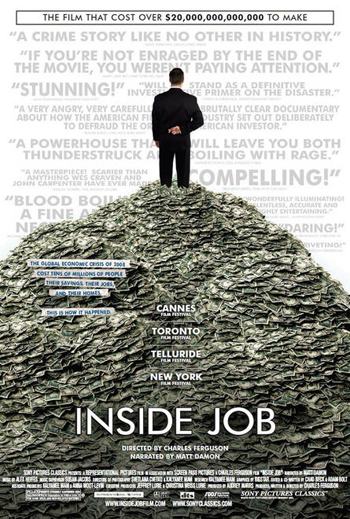Courtesy of Jesse’s Americain Cafe
 See Charles Ferguson’s documentary Inside Job when you have the opportunity. I understand that the DVD may be released sometime around March 2011.
See Charles Ferguson’s documentary Inside Job when you have the opportunity. I understand that the DVD may be released sometime around March 2011.
Ferguson starts his presentation at about 7 minutes in.
I was glad to hear him admit that he was wrong, honestly wrong, about his assessment of Japan Inc. and the Japan asset bubble. He also goes on to make a rather pointed observation about economics which needs to be heard dispassionately by related institutions in particular, whose own credibility and integrity is at risk.
"It is one thing to be honestly correct or not correct about something; it’s another thing for an academic discipline to have a systemic corruption problem. And that’s what I will be talking about in part later, because the economics discipline in my view does have that problem."
In Charles’ defense he is only saying publicly what is being said privately amongst academic scientists and mathematicians about the inordinate effect of power and money on the integrity of economic opinions and research.
As you may recall Alan Greenspan was caught up in the Keating Five S&L scandal. The point of this is that the ’empirical objectivity’ of the Federal Reserve in setting policy is a myth as egregious as the trickle down theory and the efficient markets hypothesis.
At the heart of the current financial crisis is the weakening and even corruption of a number of institutions, both public and private. And their reform and restoration to a fully functional state remains to be accomplished. Reforms risks disclosure, and coverups protect the status quoagainst such the effects of such a disclosure. This is why reform from within is problematic.
Yes, there is always the need for some discretion and privacy in executive decisions. But it must be limited and exceptional, subject to overview by a more relatively impartial third party, always.
The Fed, and particularly the New York Fed, is a largely private institution making decisions not only about its own industry, but is taking actions with public funds that approach and sometimes become de facto public policy decisions with far reaching effects, and is doing so largely in secret. It is therefore highly vulnerable to insider dealing and conflicts of interest. Excessive secrecy is inimical to a free society, for wherever secrecy and power exist, corruption quickly follows.
The only cure for these conflicts of interest is a balance of power and above all, transparency. Sunlight is a marvelous disinfectant. Disclosure, disclosure, disclosure. The more that a bureaucratic organization resists even routine disclosure the more likely it is that they have become internally focused, less effective, and probably have some things to hide.
Link to original video at MIT here.
h/t to Paul Kedrosky and Yves Smith.


